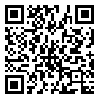BibTeX | RIS | EndNote | Medlars | ProCite | Reference Manager | RefWorks
Send citation to:
URL: http://ijme.tums.ac.ir/article-1-5792-en.html

 , Maryam Heidari *
, Maryam Heidari * 
 2, Shahrzad Nezarat3
2, Shahrzad Nezarat3 
 , Mahsa Mousavi3
, Mahsa Mousavi3 
 , Mohammad amin Harizavi3
, Mohammad amin Harizavi3 
 , Atefeh Zahedi4
, Atefeh Zahedi4 

2- Department of Medical Surgical Nursing, Abadan school of Medical Sciences, Abadan, Iran;
3- Abadan School of Medical Sciences, Abadan, Iran
4- Department of Epidemiology, Abadan School of Medical Sciences, Abadan, Iran
Ethics of care are the central core of nursing values and a fundamental concept in the nursing profession. Since the outlook of nurses on ethics can affect the quality of care, the present study was conducted to investigate the attitude of nursing students to codes of ethics for nurses, their commitment to ethics of care, and academic dishonesty in Abadan School of Medical Sciences.
This descriptive analytical study was performed among 150 nursing students of Abadan School of Medical Sciences by census sampling in 2016. After giving their informed consent, the students completed the questionnaire designed by McCrink in 3 sections: 1) demographic information, 2) attitude to ethics codes, commitment to ethics of care and neutralization behaviors, and 3) outlook on academic dishonesty. Data were analyzed using descriptive statics, chi-square test and Pearson’s correlation coefficient in SPSS version 21.
The results showed that the students had the most positive attitude to ethics codes and commitment to ethics of care, and the most negative attitude to neutralization behaviors. Less than half of the participants had a negative outlook on academic dishonesty. Moreover, about 40 percent of the students reported academic dishonesty among their classmates. Ethics codes are moral values in academic and clinical settings and should therefore be considered as major components of initial nursing education programs. Additionally, it seems necessary to make efforts in order to change nursing students’ attitude toward academic dishonesty.
Received: 2016/08/10 | Accepted: 2016/10/5 | Published: 2016/10/18
| Rights and permissions | |
 |
This work is licensed under a Creative Commons Attribution-NonCommercial 4.0 International License. |



